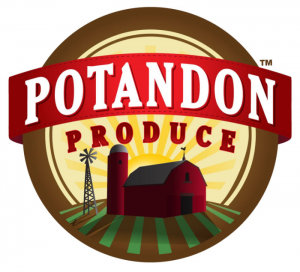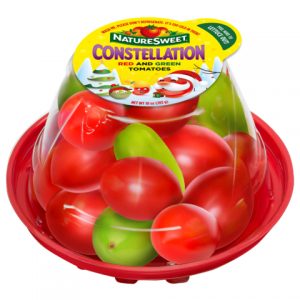Potandon’s CEO Retires, Fresh Direct Ex-CEO Steps In
 Potandon Produce, one of the largest providers of fresh potatoes in North America and global leader within the world’s top three food crops, has announced that Mel Davenport, the company’s chief executive pfficer, will retire after 30+ years of service marked by the launch of Klondike Goldust and Klondike Rose potatoes and the CarbSmart line. Succeeding him as CEO will be David Lawrence, former CEO of Fresh Direct, effective immediately.
Potandon Produce, one of the largest providers of fresh potatoes in North America and global leader within the world’s top three food crops, has announced that Mel Davenport, the company’s chief executive pfficer, will retire after 30+ years of service marked by the launch of Klondike Goldust and Klondike Rose potatoes and the CarbSmart line. Succeeding him as CEO will be David Lawrence, former CEO of Fresh Direct, effective immediately.
Over the past nearly three decades, Davenport has helped guide the company through significant growth and innovation in the fresh produce market. Under his leadership, Potandon strengthened its market position, continued the expansion of its Green Giant Fresh products, expanded its product offerings, and fostered a culture of excellence and sustainability.
“Mel’s well-deserved retirement marks the culmination of a career,” said Jeff Sholl, founder and managing member of Potandon. “As a key member of Potandon’s senior management team, Mel has been a cornerstone of our business since its inception and his leadership has been pivotal to the company’s position today. As we celebrate Mel’s contributions, we also look forward to an exciting new chapter under the leadership of David Lawrence, whose vision and expertise will guide Potandon toward continued growth and success.”
Lawrence brings a wealth of experience and proven leadership in the fresh food and logistics industries. During his tenure at Fresh Direct, Lawrence spearheaded initiatives that enhanced customer experience, streamlined operations, and drove significant business growth. His deep understanding of consumer needs and his commitment to innovation align seamlessly with Potandon’s vision for the future. Prior to that, Lawrence served as the President of Taylor Farms Northwest, LLC, CEO of National Pecan, LLC, and President of C.M. Holtzinger Fruit Company. With a track record of driving growth, operational excellence, and innovation, Lawrence is well-positioned to lead Potandon Produce into its next chapter.
“I am looking forward to joining Potandon Produce and building upon the strong foundation established by Mel and the team,” said Lawrence. “At a time when consumers are more focused on functional foods, health and nutrition than ever, I’m proud to join a company that understands these evolving needs and is committed to delivering unique varieties and such a huge consumer footprint for providing nutritious, high-quality produce to meet them.”
Potandon Produce is an ag-tech and food-tech leader, and one of the largest providers of fresh table stock potatoes in the nation and also a leading provider of fresh onions. Its product line includes Minute Mashers™, ONE STEP… DONE!, and classic russet, yellow, red, and white potatoes. The company’s unique vertical integration has led to a state-of-the-art variety development program for unique potato varieties, conventional and sweet onions, and many others within the world’s top 3 food crops, and that looks ten years down the road to develop potatoes for future shoppers based on extensive consumer research.
For more news of interest to the produce industry, subscribe to Gourmet News.
NatureSweet Constellation Holiday Medley Debut
 This holiday season, NatureSweet is bringing festive cheer to kitchens nationwide with its Constellation blend of red and green snacking tomatoes. Perfect for adding a pop of color and flavor to festive appetizers, charcuterie boards, salads and seasonal dishes, this 10-oz holiday medley offers a delightful balance of sweet red Cherubs and floral green grape tomatoes, enhanced by subtle hints of aromatic herbs.
This holiday season, NatureSweet is bringing festive cheer to kitchens nationwide with its Constellation blend of red and green snacking tomatoes. Perfect for adding a pop of color and flavor to festive appetizers, charcuterie boards, salads and seasonal dishes, this 10-oz holiday medley offers a delightful balance of sweet red Cherubs and floral green grape tomatoes, enhanced by subtle hints of aromatic herbs.
“At NatureSweet, we love to make memories, even with our favorite, sweet snacking tomatoes,” said Mary Pettis, brand manager at NatureSweet. “Many consumers have shared how excited they are to try green tomatoes and create beautiful platters to share with guests. Families may also enjoy leaving these little red and green tomatoes out for Santa and his reindeer— a fun way to incorporate healthy options alongside traditional holiday treats. We’re proud to offer healthy snacking choices year-round, and especially during the holiday season when everyone’s enjoying delicious food together.”
Available for a limited time this December, the Constellation Red and Green Blend is a seasonal favorite and is available in a 10-oz package at select retailers, including Roundy’s Supermarkets, Hy-Vee, Topco, Peirone Produce, and Big Y. Suggested retail price is $3.49.
Make this holiday season even more special with NatureSweet Constellation tomatoes, a flavorful and colorful way to elevate your favorite dishes and celebrate the season.
NatureSweet, the leading brand in snacking tomatoes, is your single-source solution for greenhouse-grown vegetables. As the largest vertically integrated controlled environment agriculture company in North America and greenhouse grower, NatureSweet owns over 1,400 acres of greenhouse space.
With a dedicated team of approximately 9,000 Associates, we carefully grow, harvest, and package a variety of fresh vegetables, both organic and conventional, including tomatoes, cucumbers, and sweet peppers. Available in major retailers across the U.S., Mexico, and Canada, our produce is handpicked at peak freshness to ensure superior quality. Committed to making a positive social, environmental, and economic impact, NatureSweet’s purpose is to transform the lives of millions of agricultural workers through a scalable and profitable business model. Our dedication to sustainability and social responsibility is reflected in our B Corp, Fair Trade and Equitable Food Initiative certifications.
For more news of interest to the produce industry, subscribe to Gourmet News.
California Grape Commission Mourns Karen Hearn
The California Table Grape Commission is deeply saddened to share that Karen Hearn, vice president of marketing, passed away on Nov. 24 after a courageous battle with cancer.
Hearn dedicated nearly 26 years of service to the California table grape industry, playing a pivotal role in the growth of innovative retail programs in the U.S. and Canada, helping to move California grape volume season after season. Her steadfast dedication to the industry stemmed from a lifelong desire to help farmers succeed.
“Karen was a special person,” said Kathleen Nave, commission president. “She loved her work; loved representing growers and knowing that actions she took helped move the crop; loved partnering with retailers to figure out new ways to motivate more sales; loved working as part of a team and helping lead that team. Her work ethic, which even illness could not conquer, was based on her unwavering belief in the value of the work and was matched only by her exceptional grace and kindness.”
Raised on a family farm in South Texas, Hearn developed a deep appreciation for agriculture from an early age. After earning a bachelor’s degree in Agricultural Journalism from Texas A&M University, she devoted her career to supporting farmers and promoting agricultural products. Before joining the California Table Grape Commission, Hearn served as marketing director for TexaSweet Citrus Advertising, implementing retail programs across the U.S. and Canada.
Hearn’s table grape legacy lives on through her daughter Kathryn Hearn who joined the commission as a marketing manager earlier this year. “It’s a testament to Karen’s passion for this industry and the work she did that her daughter followed in her footsteps,” Nave said. “We all learned so much from Karen. Her grace, determination, generosity, and warmth made a lasting impact on those whose lives she touched.”
Heartfelt condolences to Karen’s husband Michael, stepson Sam, Kathryn, and her extended family.







